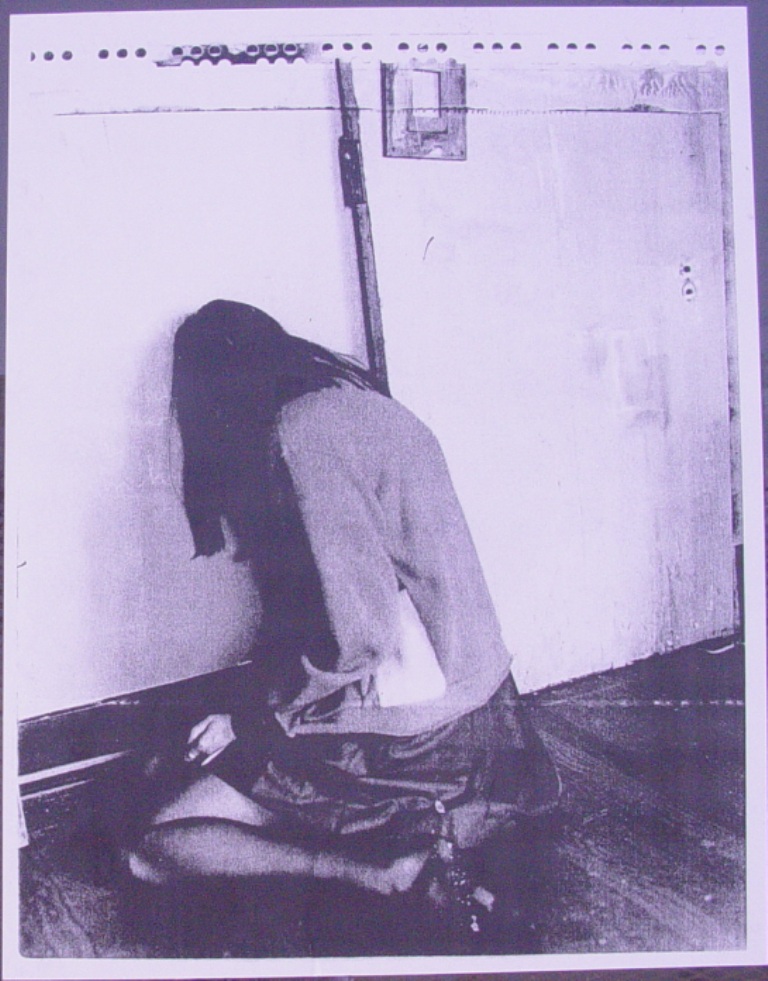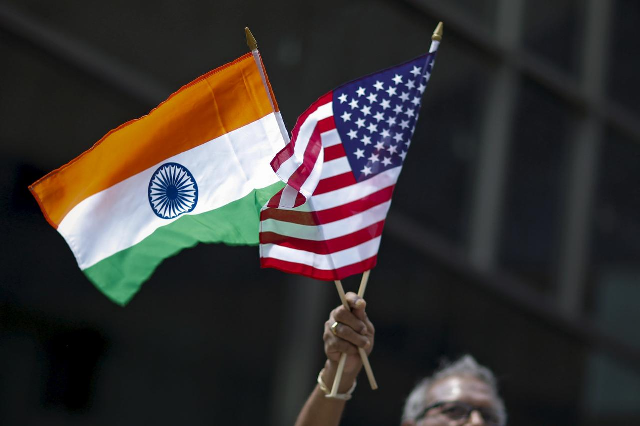
"She would pull my hair out, violently hit me over the head... most of the times she got angry out of the blue," the 18-year-old told AFP, as she recovered in a New Delhi hospital.
The girl says she was beaten with belts, brooms and chains while locked in the home where she was hired to work as a maid in an upscale neighbourhood in the capital.
"She wouldn't give me any money, make any phone calls, interact with anyone. She ripped all my papers that had phone numbers (of her relatives) into bits," said the girl, whose left cheek and chest are covered in scars.
Her story made headlines this month after she was rescued by police and social rights campaigners who said she had been slashed with knives and bitten by dogs.
The case is far from unique in a country home to almost half of the world's slave population. A report released this week called the Global Slavery Index found an estimated 13.95 million people in India are victims of forced labour.
"People are controlled by violence," said Nick Grono, chief executive of the Walk Free Foundation, which published the report.
"They are tricked or they are forced into jobs or situations where they are economically exploited. They live on no pay or base subsistence pay and they're not free to leave."
The girl, who only completed three years of school, came to the teeming capital from the impoverished eastern state of Jharkhand searching for work to send money back home.
The teenager, who cannot be named for legal reasons, worked in several homes before a maid agency placed her with her current employer, who was arrested and has denied charges of abuse. The case is still before the courts.
In India, mainly women are trafficked, coerced or tricked into different forms of slavery ranging from domestic service to prostitution and forced marriages. Desperately poor parents also sell their children, who are then forced into begging rackets, sexual exploitation and manual labour such as working in coal mines, according to other experts.
Still more are kidnapped and brought to Delhi, according to the UN's Office on Drugs and Crime (UNDOC).
"Delhi is a destination and transit point for victims" trafficked from throughout India as well as neighbouring Nepal and Bangladesh, a UNDOC report released in July said.
The report warned that trafficking in the capital, in particular, was worsening, with criminal gangs expanding their operations by disguising them as businesses such as placement agencies and massage parlours.
Weeks after her daughter was snatched from a village in a remote corner of India, Rabia Bibi found herself in the seedy backstreets of Delhi.
With no money and little knowledge of life outside her village, Bibi travelled to the capital in a desperate bid to find her. For weeks she shadowed police during raids on the city's squalid hotels.
Bibi said she had little choice after 17-year-old Ranoo, her youngest of nine children, disappeared without trace on her way to buy food in West Bengal.
"Three fishermen saw my daughter screaming inside a speeding car," said Bibi, offering AFP what little information she had about the kidnapping.
Navin Haro, a poor labourer, had been equally determined to find his daughter, 13-year-old Jyoti Mariam. She was taken in broad daylight earlier this year from their village in Chhattisgarh state as she returned from school.
According to the National Crime Records Bureau, some 38,200 women and children were reported kidnapped last year in India, compared with 35,500 the year before. Rights groups say the actual number is probably much higher.
For Bibi, each police raid brought more despair, as officers rescued girls with a similar age as her daughter, but never her own.
Although both girls were victims of trafficking, their fates turned out to be very different. Ranoo was finally found weeping but alive by police, locked in a shabby hotel room.
Haro, however, discovered Mariam's body about one week after she went missing, wrapped in plastic, in a hospital morgue.
"I lost my daughter because I had no money to even trace her," Haro said, as he prepared to bury his daughter in a Christian cemetery.
"Tell me: how would I have traced her in this big country?"
Mariam's official cause of death was listed as malaria, giving police little incentive to treat her case as a criminal one and find her kidnappers.
Armed with laws against trafficking and slavery, police are arresting those behind such rackets, but experts say more coordinated action is needed.
"The crime knows no jurisdiction, it knows no borders between one country and another or one state and another state," said Bhamati, who has worked for the federal government to develop anti-trafficking policies.
Shakti Vahini (Power Brigade), an organisation working with police to rescue victims, says India's recent economic growth has fuelled the problem.
"Rich people are willing to pay any amount of money to get servants who can clean their houses, survive on left-over food," said the organisation's Rishi Kant.
"Illegal placement agencies offering house maids have mushroomed in every city across India."
For the 18-year-old rescued in Delhi, life should slowly return to normal. Her mother travelled to the capital and planned to take care of her at home.
"I'll put her back in school again," the mother told AFP. "There is no need to do this kind of work."
COMMENTS (14)
Comments are moderated and generally will be posted if they are on-topic and not abusive.
For more information, please see our Comments FAQ

1736937713-0/Untitled-design-(100)1736937713-0-165x106.webp)
1736991329-0/Untitled-design-(62)1736991329-0-165x106.webp)
1736988313-0/kylie--(1)1736988313-0-165x106.webp)
1736984998-0/Trump-(5)1736984998-0-165x106.webp)












In India we find many children, mainly girls as young as 8 years old employed by families to do housework. It is so sad. These children miss out on schools. They miss out their entire childhood, no play, etc. Many families think that they are helping out these children by employing them so that they can earn for their food. This thinking should change and those employing children should realize that they are doing the most inhumane act and robbing away the entire childhood and life of these children. Government came up with laws against child labor few years ago. But, the implementation is very much lacking. Neighbors who see children employed by others in their neighborhood should condemn and report these activities to the law enforcing agencies. Also, Law enforcing agencies should enforce laws and award severe punishments. More than anything, the thinking and habits should change in every family. Child labor is the root cause of many social evils. We are not helping a child by providing employment opportunity but we are steeling the entire life and childhood of the child. It is far worse than killing the child.
Just enjoy all pakistanis. this news to entertain you people nothing else.
This end-to-end system functions like the old slave trade from Africa to America and other continents — in which the church had also played a major role. .In the most recent episode of this tragedy, a woman executive working for a French multinational in Delhi has been arrested on charges of committing atrocities against a girl from the Santhal tribe of Jharkhand state. The maid comes from Sahibgunj, one of India’s poorest districts. The media is having a field day sensationalising this as child labour, even after the police confirmed that documents in her village show her to be over the age of 18. The girl had worked for this executive for only 3 months, prior to which she had worked in numerous other households in Delhi since age 15. So the child labour stage of her exploitation was done under several previous employers. But there is no investigation of the previous employers. Why?The reason for authorities not pursuing the earlier employers is that the girl is a Christian convert from a very poor family; and uncovering the entire chain of events and parties involved would expose the nexus of the Jharkhand church,
Certain politically connected NGOs that make noises in the metros ostensibly on behalf of the victims operate what amounts to a human trafficking industry. In reality the noise made serves to cover up the sinister role of NGOs in this industry that brings Christianity to the remote villages in exchange for maids to Delhi.The elaborate scheme works as follows. Christian missionaries in adivasi (indigenous, “tribal”) areas offer poor families an inducement that is hard to resist: If the family converts to Christianity, one of its young daughters will be sent as a domestic servant to Delhi or another metro.The affiliated “agencies” in the metros collect placement fees up to Rs 50,000 per maid from the household that hires them. In between the point of “recruitment” and the point of placement there are intermediaries that “sell”, transfer and move the young, vulnerable person through the supply chain. Money is exchanged at each stage.
The money given to the parents is a “down payment” to convert them, their daughter’s placement as maid being part of the transaction. Many churches also provide safe transfer of the girl’s monthly salary back to her parents, with a certain “donation” charged by the church for its services. All this is a package deal for “being saved”.
http://www.niticentral.com/201...
This end-to-end system functions like the old slave trade from Africa to America and other continents — in which the church had also played a major role. .In the most recent episode of this tragedy, a woman executive working for a French multinational in Delhi has been arrested on charges of committing atrocities against a girl from the Santhal tribe of Jharkhand state. The maid comes from Sahibgunj, one of India’s poorest districts. The media is having a field day sensationalising this as child labour, even after the police confirmed that documents in her village show her to be over the age of 18. The girl had worked for this executive for only 3 months, prior to which she had worked in numerous other households in Delhi since age 15. So the child labour stage of her exploitation was done under several previous employers. But there is no investigation of the previous employers. Why?The reason for authorities not pursuing the earlier employers is that the girl is a Christian convert from a very poor family; and uncovering the entire chain of events and parties involved would expose the nexus of the Jharkhand church,
Sad to see Indians making a fuss over reality. We know the mess in our country but to defend whats happening in your country by telling us the same happens in pakistan doesn't make you any better. Instead of fighting among ourselves we should be seeking to eradicate this evil from society. No offence intended to anyone :)
These practices are a matter of crying shame for us Indians. I don't know how can people be so cruel to another human being. Dear readers please don't go by "Incredible India" or "aman kis Asha" slogans...these are just marketing catch words. we all know the ground reality too well. its just a matter of not admitting it. I hope readers here stop commenting here just to prove that their society is better than their neighbors. Its time we realize and accept publicly that both societies have pretty serious problems with our socio-economic development. Horrible poverty,poor education, divided society, corrupt ruling class the list goes on. Now we can either comment constructively and buck each other up to rise to a higher level or we can go back to pulling each other down.
@Indian Reader: Why you indians cry out loud when mirrors are shown to you? 1000times more? several references have been quoted in this report and you just come up with a number!
@Indian Reader: Here is the example, British citizen of Pakistani origin has been found guilty of trafficking a young girl into the UK http://dawn.com/news/1050140/briton-convicted-of-enslaving-and-raping-trafficked-pakistani-girl
@Indian Reader: yeah exactly...... just to give an example how dumb this paper is ... it did not cover the news of murder of pakistani model in islamabad even though world around condemned it..........
@RealBloch: u just screwed 2 different things all together ......... meaningless talks is what makes u guys unique......
When Pakistani newspapers comes up such story about India, they fail to understand that the same thing also happens in Pakistan 1000 times more.
Its all about real Incredible India. Yet every time you ask any Indian he will tell India as bollywood style hoax.
Pray that she was not found in a Pakistani home in Delhi, for the story is too similar to what we read in Pakistani local reports. Having said that, I would thereafter urge my fellow-countrymen to convince our 'Vacant' PM to use this story as further justification of commonality of aims and vision of our respective nations to get together for peace, perhaps even a partnership in some Scrappy enterprise.